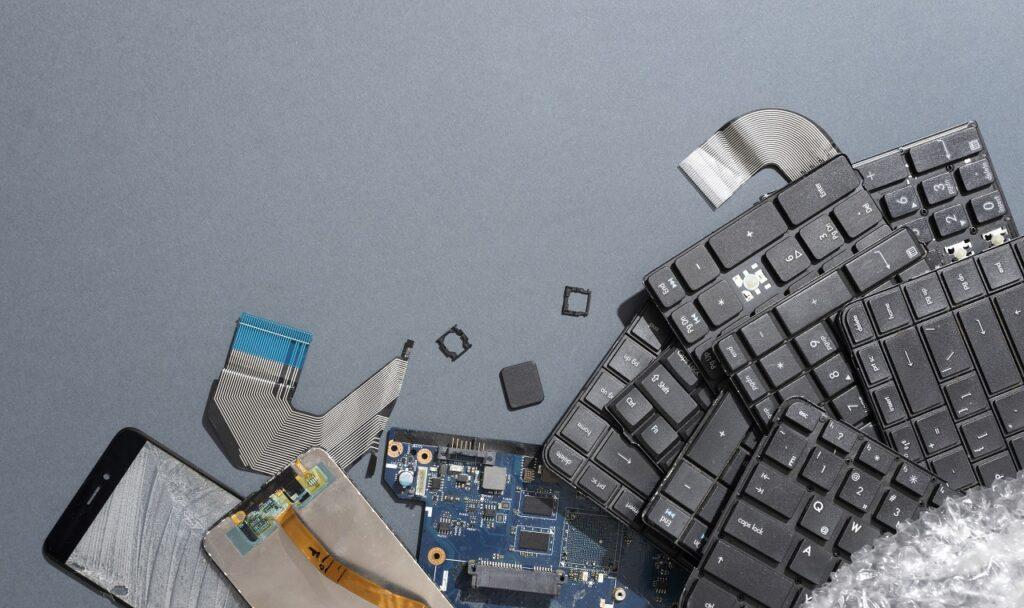Today’s businesses rely heavily on electronics to function and remain competitive in their respective markets. Businesses are always searching for the newest, fastest, and smartest solutions to help them manage their hectic daily tasks. Technological innovation is occurring at an increasingly rapid rate in our society. And as such, e-waste is also increasing at a rapid rate. In this blog, we’ll go through the importance of responsible methods of disposal of e-waste in India.
In this blog, we’ll also examine how careless e-waste disposal methods merely fuels the growth of an ever-increasing amount of electronic garbage(e-waste). We’ll also go through how e-waste affects the environment and human health, and how organizations may put an efficient electronic waste disposal program in place.
What are the Problems with E-Waste Disposal?
E-waste is quickly expanding and becoming the most common waste stream in our country. Electronic waste examples include any outmoded, useless, or malfunctioning electronic parts, components, and materials. Electronics that are going to be reused, resold, salvaged, or recycled are also included in the category of electronic garbage along with items that can be recycled through an electronic recycling program.
E-waste management takes extra precautions because the insides of our devices can contain a host of harmful materials, including:
- Mercury
- Beryllium
- Lead
- Cadmium
- Arsenic
- Brominated flame retardants
There can be a severe environmental impact of e-waste if they aren’t handled correctly. They can also adversely affect human beings causing organ damage, neurological damage, and severe illness. These issues pose risk to the workers that directly handle e-waste and pose a threat to communities that are shipped excess e-waste.
E-waste Disposal Solutions for Your Business
What is the best approach for e-waste disposal given that we know how bad it is for the environment? How can businesses work to strengthen their e-waste disposal activities in a modern workplace full of constant technological advancements?
There are easy ways for your company to use technology properly without escalating the issue of electronic pollution.
Here are three e-waste disposal methods to help your company promote electronic recycling and combat this ever-expanding type of waste.
1. Make Knowledgeable Purchases
Preventing electronics from ever ending up as waste is the greatest approach to avoid having to deal with e-waste. This approach to managing electronic trash begins with the purchasing phase.
Companies frequently buy large quantities of devices for staff use. Do some research first before choosing the choice with the best reviews.
Have a discussion with a local shop. This might help you identify the best electronics for your company’s requirements. You can do this by posing queries like, “Which brands have the lowest return rates?” and “Which models require the least amount of repair?” By obtaining real-world information, you can make the most informed—and sustainable—decisions.
2) Upgrade or Fix Your Electronics
Electronics that are older aren’t necessarily out of date. Your IT department can help you in this regard. You may determine if your printer should be retired or merely needs some minor repairs by having IT. You can assess the costs and benefits of upgrading or repairing it.
Additionally, fresh hard drives, software, or extra memory can make old equipment feel more modern and function more effectively. As a result, less e-waste will leave your business.
Recall your DIY options. Many office gadgets have basic repair lessons available online for those who are interested; a remedy can be just a few keystrokes away.
3) Donate, Trade, or Sell E-waste
When your office equipment has genuinely reached the end of its useful life, keep in mind that one man’s trash is another man’s treasure.
It’s imperative to make sure that your IT department has completely removed any electronic equipment’s corporate information before dumping it, regardless of whether you decide to sell or donate your company’s used devices.
Donating is the best option for e-waste disposal when electronics are still functional. This method of managing e-waste is not only a terrific approach to lessen electronic pollution, but it might also please your accounting team. Donating gadgets can have the benefit of tax deductions. Additionally, giving enables your company to provide those in need with products like computers, phones, or tablets.
Conclusion
When an electronic device is too damaged to be repaired, sold, or donated, it is a perfect opportunity to recycle it.
Old computers, office supplies, televisions, phones, and other consumer devices all have uses other than tormenting landfills for the rest of their lives. Electronics that can be recycled should actually be viewed as commodities and potential sources of income. This equipment may result in fresh cash flow, depending on the quantity, location, and type of e-waste generated by your company. We must realize the importance of recycling e-waste for our financial and environmental health. Your business can collaborate with Go green management for pick-up and/or drop-off facilities for recycling outdated electronic items. We provide complete e-waste disposal and management solutions for companies of all sizes. We collect and recycle all sorts of e-waste, including computers, printers, fax machines, TVs, VCRs, cell phones, microwaves, and more.

